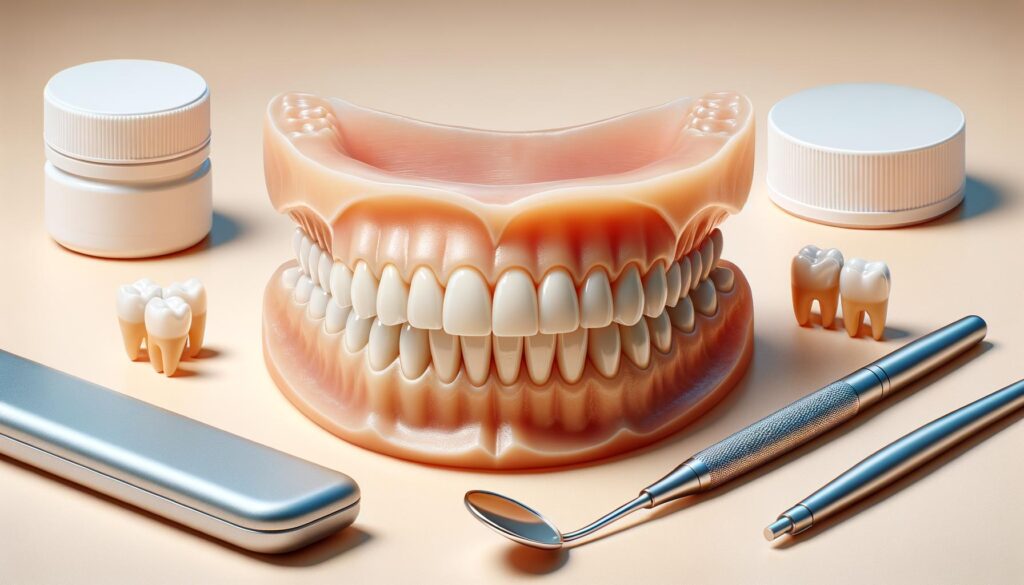A Comprehensive Guide to Dentures

Understanding Dentures: The Basics
Dentures are removable appliances that can replace missing teeth and help restore your smile. They are typically composed of a gum-colored acrylic base that fits over your gums and supports false teeth made from various materials. There are several types of dentures available, and the choice often depends on the condition of your remaining teeth and gums, as well as your personal needs and preferences.
Full dentures are used when all the teeth are missing, while partial dentures are suitable for individuals who still have some natural teeth remaining. In addition to these, there are immediate dentures that can be placed right after tooth extraction, and implant-supported dentures, which offer increased stability by anchoring the denture to dental implants.
Understanding the options available is crucial for making an informed decision. It’s vital to discuss all available types with your dentist, who can provide guidance based on your oral health and specific circumstances.
The Process of Getting Dentures
Acquiring dentures involves multiple stages, ensuring that the final product meets your expectations and needs. Initially, dental impressions are taken to capture the exact contours of your mouth. Once these molds are completed, the dental laboratory will create a model that can be tried in your mouth to ensure proper fitting and comfort. Adjustments are made to the model if necessary before the final set of dentures is produced.
This stage can take several weeks and may involve several visits to the dentist to ensure a precise fit. Once the dentures are crafted, a fitting appointment will confirm they are comfortable and function smoothly. Subsequent appointments may be necessary to make adjustments as you adapt to wearing them.
Patience and communication with your dentist are key during this process. Don’t hesitate to voice any discomfort or concerns you might have. A perfect fit may require time and patience, but it’s worth it for the long-term benefits.
Adjustment Period: What to Expect
Adjusting to new dentures can take time as you adapt to speaking and eating. While they can eventually provide great functionality, initial discomfort is common. You may experience soreness as your mouth gets used to the new appliance. Over-the-counter pain relief and a soft-food diet can ease discomfort during this period. It’s also helpful to practice speaking to regain clear and confident speech.
Furthermore, it’s essential to maintain preemptive care to avoid common issues such as gum irritation. Keep your dentures clean and patiently allow time for your mouth to adjust. Regular check-ups with your dentist can help address any issues arising during the adjustment period.
This transition can be managed through patience, proper care, and with the guidance of your dental professional, ensuring a positive and lasting experience with your dentures.
Caring for Your Dentures
Proper care and maintenance of dentures can significantly extend their lifespan and enhance oral hygiene. Here are some tips for maintaining your dentures:
- Clean your dentures daily using a toothbrush and a non-abrasive cleaner. Regular toothpastes can be too harsh.
- Rinse your dentures after meals to remove debris.
- Soak them overnight in a denture-cleaning solution to maintain their shape and keep them free from bacteria.
In addition, it’s imperative to ensure your gums and any remaining natural teeth are kept clean. Regular visits to your dentist will help monitor any changes in your oral health, ensuring your dentures remain fitting well and comfortable.
Ensuring that you follow these care instructions will maintain a high level of hygiene and avoid potential mouth infections or dental issues.
Benefits and Considerations
Opting for dentures can significantly improve your quality of life by restoring functionality and aesthetics. Some benefits include:
- Enhanced ability to chew and enjoy a wide range of food.
- Improved speech clarity.
- A boost to your self-confidence through a restored smile.
However, there are considerations to keep in mind. Maintaining comfort and functionality over time may require adjustments, and they might not suit everyone’s lifestyle or personal comfort preferences. Consultation with a dental professional can highlight these factors, providing a realistic view of life with dentures.
While some may find the transition challenging, embracing dentures can offer renewed oral health and a positive impact on day-to-day living.
Conclusion: Taking the Step Towards Dentures
Deciding to use dentures is a significant step that can bring about positive changes in both oral health and overall quality of life. Understanding the various types and the fitting process, as well as committing to proper maintenance, can lead to a comfortable and fulfilling experience. Although the adjustment period may present challenges, the ultimate benefits often outweigh these minor hurdles, paving the way to renewed confidence and functionality.
By educating yourself about dentures and working closely with a dental professional, you can make informed decisions that best suit your lifestyle and health needs, ensuring that you reclaim your smile with confidence and ease.
